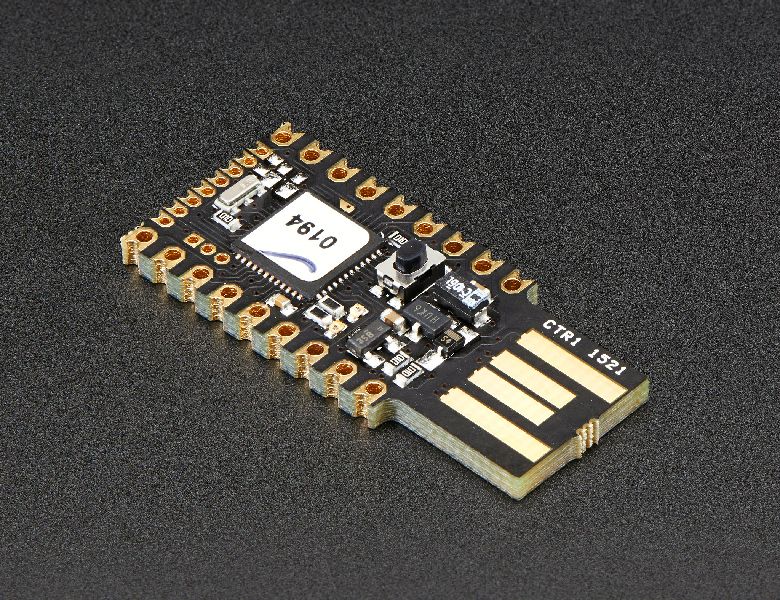
Espruino Pico by Espruino
Control Electronics quickly and easily with a tiny USB stick that runs JavaScript - introducing the Espruino Pico! Dig in to the JavaScript of things, with a mini version of the popular Espruino board we already carry
This little board has an STM32 microcontroller pre-programmed with Espruino all ready to go so you can start playing immediately. Warning: if you only use Assembly and think that even embedded C/C++ is for wimps, this device might explody your head.
Essential Features:
- 22 GPIO pins: 9 analog inputs, 21 PWM, 2 serial, 3 SPI, 3 I2C
- All GPIO is 3.3V but 5 volt tolerant
- 2 rows of 9 0.1” pins, with a third 0.05” row of 8 pins on the end
- On-board USB “PCB Type” connector, plugs right into any computer USB port
- Two on-board LEDs and one button
- STM32F401CDU6 CPU - ARM Cortex
- On-board 3.3v 250mA voltage regulator, accepts voltages from 3.5v to 16v
- Current draw in sleep: < 0.05mA - over 2.5 years on a 2500mAh battery
- On-board FET can be used to drive high-current outputs
Note: As of Friday, October 2nd, 2015 we are selling the updated Pico with both a more helpful silkscreen marking for power, an updated USB power diode, and a 500mA polyfuse added!
The Espruino Pico is a USB stick with a tiny computer and JavaScript interpreter built in, allowing for instant feedback from whatever device you’re working with. Simply set up your code with the Espruino and send it to the device without having to wait for the board to ‘flash.’
The Pico is also designed to be easy to include in your own designs and builds. The .01” pins are easy to fit in to sockets, and castellated edges mean that unpinned Picos can easily be surface-mounted directly to a PCB. And to make it even easier, Espruino provided a part library for Eagle CAD that includes the Pico’s footprint in several different configurations.
The Espruino Pico’s fast response time has a lot of advantages. It allows for quick and easy debugging and is a great way to test your project before your big reveal. In addition, you can control the Espruino from almost anything - Windows, Mac OS, Linux, RasPi, Android, anything that can talk to a USB Serial port.
Purchase
Contribute
Have some info to add for this board? Edit the source for this page here.
CircuitPython 9.2.8
This is the latest stable release of CircuitPython that will work with the Espruino Pico. Use this release if you are new to CircuitPython.
Modules included in this download
_asyncio _pixelmap adafruit_pixelbuf analogio array atexit binascii bitbangio board builtins builtins.pow3 busdisplay busio busio.SPI busio.UART codeop collections digitalio displayio epaperdisplay errno fontio fourwire getpass i2cdisplaybus io json locale math microcontroller neopixel_write onewireio os os.getenv pulseio pwmio rainbowio random re rtc sdcardio select storage struct supervisor sys terminalio tilepalettemapper time touchio traceback usb_cdc usb_hid usb_midi warnings zlibFeatures: Castellated Pads
CircuitPython 10.0.0-beta.0
This is the latest development release of CircuitPython that will work with the Espruino Pico.
Alpha development releases are early releases. They are unfinished, are likely to have bugs, and the features they provide may change. Beta releases may have some bugs and unfinished features, but should be suitable for many uses. A Release Candidate (rc) release is considered done and will become the next stable release, assuming no further issues are found.
Please try alpha, beta, and rc releases if you are able. Your testing is invaluable: it helps us uncover and find issues quickly.
Release Notes for 10.0.0-beta.0
Modules included in this download
_asyncio _pixelmap adafruit_pixelbuf analogio array atexit binascii bitbangio board builtins builtins.pow3 busdisplay busio busio.SPI busio.UART codeop collections digitalio displayio epaperdisplay errno fontio fourwire getpass i2cdisplaybus io json locale lvfontio math microcontroller neopixel_write onewireio os os.getenv pulseio pwmio rainbowio random re rtc sdcardio select storage struct supervisor sys terminalio tilepalettemapper time touchio traceback usb_cdc usb_hid usb_midi warnings zlibFeatures: Castellated Pads
Absolute Newest
Every time we commit new code to CircuitPython we automatically build binaries for each board and language. The binaries are stored on Amazon S3, organized by board, and then by language. These releases are even newer than the development release listed above. Try them if you want the absolute latest and are feeling daring or want to see if a problem has been fixed.
Previous Versions of CircuitPython
All previous releases of CircuitPython are available for download from Amazon S3 through the button below. For very old releases, look in the OLD/ folder for each board. Release notes for each release are available at GitHub button below.
Older releases are useful for testing if you something appears to be broken in a newer release but used to work, or if you have older code that depends on features only available in an older release. Otherwise we recommend using the latest stable release.
